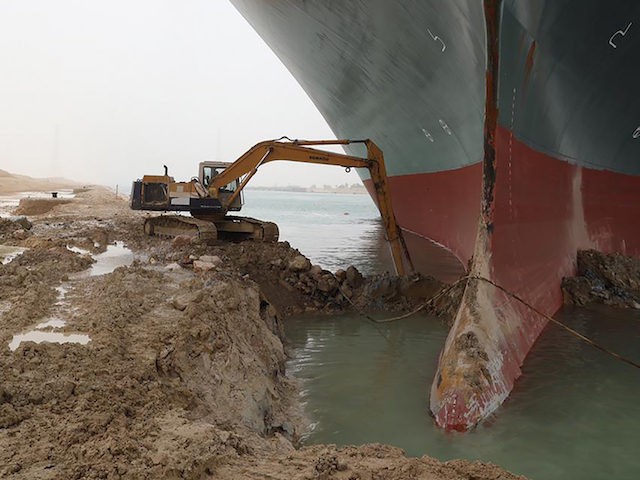The blockage of the Suez Canal by stranded container supership MV Ever Given is turning out to be more of a catastrophe than originally anticipated.
Taiwan-based Evergreen Group, the ship’s operator, said Friday it will take at least another two or three days to get the ship moving again, and it could take weeks for Suez traffic to return to normal.
Maritime traffic is beginning to route around the blocked canal, adding weeks to shipping time and millions in additional costs. An estimated $9.6 billion in shipped goods is being held up by the calamity every day.
Early bouts of optimism that tugboats could dislodge the ship, or at least move it out of the way, gave way Thursday to viral images of bulldozers vainly attempting to dig sand away from the hull of the ship or nudge it back into the water. Observers around the world are trying to find a dash of humor in the bizarre images:
Evergreen representatives said the effort to dig sand away from the bow of the ship and refloat it at high tide would require up to three more days. A refloating attempt on Friday was unsuccessful.
Suez Canal officials originally hoped the ship could be moved within a matter of hours and the canal could reopen by the weekend. An adviser to Egyptian President Abdel Fattah el-Sisi predicted Thursday that navigation through the canal “will resume again within 48-72 hours, maximum,” a far more optimistic estimate than most other analysts are offering.
“It’s a difficult process. The ship’s bow is still wedged in the canal wall, and there could be some structural damage. If you try to yank it out, things could get worse and fuel could spill out. It’s the worst place in the canal for such a big ship to be stuck,” a source involved in the operation told the Wall Street Journal (WSJ).
According to the WSJ, after waiting a few days to see how the rescue operation was going, the owners of some 300 idled ships have begun rerouting them around the canal toward the Cape of Good Hope, or making other adjustments to the course of ships approaching through the Mediterranean. Some operators are apparently choosing to sit tight and wait for the Suez to clear, since the alternate route can add weeks to a ship’s journey.
A logistics expert told the BBC on Friday it would take about two days to undo every day of delay from the closed canal.
“If the delays are short, most companies will absorb the extra delay in transit times. But salvage officials said the congestion could last days or even weeks, in a blow to global supply chains already strained by the Covid-19 [coronavirus] pandemic,” the BBC reported.
The Suez situation is fast becoming a global shipping and oil crisis, and the WSJ explained it will affect American companies and consumers:
While European and Asian businesses are likely to feel the brunt of the disruption, U.S. importers could also be affected. Demand for containers and berthing space soared late last year and into this year, well before the current Suez crisis. Backups in container ports, especially along the West coast of the U.S., have grown during a normally slack period in shipping demand. That has tied up inventories for weeks in some cases, as ships wait to reach berths while unloaded containers sit for long periods at packed freight terminals.
The Suez blockage “will drastically reduce global container shipping capacity and lead to further delays for American importers to get their orders delivered,” said Lars Jensen, chief executive of Copenhagen-based SeaIntelligence Consulting. “This couldn’t have come at a worse time because all ships available have already been deployed.”
Rising costs of shipping are expected to ripple through the global economy, affecting even companies that ship by truck and rail. Shipping costs are already up some 30 percent worldwide, with some even higher spikes reported.
Port authorities are bracing for pandemonium when fleets of long-delayed ships finally begin arriving after rounding the Cape of Good Hope or waiting for the Suez Canal to clear. Just as a problem with one airport can cause a chain reaction of disruptions and missed connections across the country, so the Suez blockage is beginning to rattle countless supply lines that were indirectly relying on shipments to arrive through the canal. Many of those secondary supply lines involved shipments of oil and gas. Fortunately, seasonal demand for oil is running relatively low at the moment.
“It’s not going to be an easy operation. It’s probably going to be an expensive one. It’s already very expensive because so many ships have been blocked from going through. More than likely there will be massive lawsuits from other shipping companies and people who expected their goods and parts to arrive on time,” U.S. National Defense University professor Paul Sullivan told Voice of America News (VOA) on Thursday.
Sullivan doubted the Egyptian government and Suez Canal operators would be held responsible for the incident, which has thus far been blamed on high winds. “The real responsibility is going to be on the part of the ship itself, and Egypt will most likely fine that shipping company and the people involved in this incident a very large sum,” he anticipated.
The Egyptians have reportedly requested assistance from the Netherlands, which was MV Ever Given’s destination. The U.S. government offered its assistance Friday, possibly in the form of a U.S. Navy dredging team. Evergreen Marine has already hired Dutch and Japanese firms to consult on refloating the ship.
“We can’t exclude it might take weeks, depending on the situation,” the CEO of Evergreen’s Dutch contractor said Thursday.

COMMENTS
Please let us know if you're having issues with commenting.